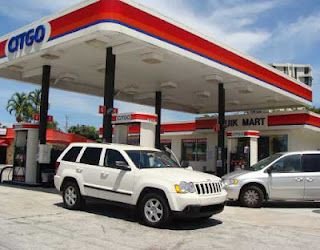Net Worth of Racetrack Gas Station 2024: How Much Is This Gas Station Brand Worth?
Net Worth of Racetrack Gas Station 2024: How Much Is This Gas Station Brand Worth?

Want to know more about the financial stakes behind the roar of racecars and the hum of gas station pumps? Racetracks and gas stations—two vastly different yet fascinating industries—hold significant economic influence. From the adrenaline-packed world of motorsports to the everyday necessity of fuel, exploring their net worth reveals some intriguing facts about their value, revenue generation, and place in the economy.
This blog will guide you through:
- The concept of net worth and why it matters.
- An overview of leading racetracks and gas stations.
- Factors contributing to their valuation and financial success.
- A comparison of their revenue streams, costs, and infrastructure.
- A glimpse into the future trends shaping these industries.
Buckle up as we take a closer look at the hidden financial engine that drives these renowned establishments.
Net Worth Explained—Why It’s More than Just Numbers
At its simplest, net worth calculates an entity’s total assets minus its liabilities. It’s not just a number but a powerful indicator of financial health and long-term stability.
For industries like racetracks and gas stations, net worth offers a snapshot of their economic impact and attractiveness to investors. Factors like infrastructure, daily revenues, customer loyalty, and brand heritage all contribute to the calculation.
Understanding the net worth of these two industries is essential not only for investors but also for fans, entrepreneurs, and local economies that rely on their success.
The Evolution and Value of Racetracks and Gas Stations
Racetracks
Racetracks symbolize thrill, power, and legacy. Some, like the Indianapolis Motor Speedway or Monaco’s Circuit de Monaco, represent more than just sports—they’re iconic destinations. Established decades ago, they’ve transformed into multi-billion-dollar enterprises.
Key revenue contributors for racetracks include:
- Ticket Sales: Large-scale international events like Formula 1 and NASCAR races generate millions in ticket sales annually.
- Sponsorships & Branding: Partnerships with global brands pump significant revenue into the industry.
- Hospitality: Luxurious VIP packages and suites offer upscale experiences, which come with premium pricing.
- Media Rights: Broadcast rights for televised races often bring in substantial income.
Gas Stations
Gas stations, on the other hand, cater to everyday needs by supplying fuel for millions of vehicles worldwide. Their economic importance is tied to scalability and convenience, resulting in consistent revenue generation.
A contemporary gas station is much more than a fuel stop. With the inclusion of:
- Convenience Stores
- Food & Beverage Services
- EV Charging Stations
gas stations have evolved into diversified enterprises. Their value lies in both the volume of fuel they sell and the ancillary services they’ve perfected over time.
Comparing the Net Worth of Racetracks and Gas Stations
Revenue Streams
Racetracks rely heavily on seasonal events such as races or music festivals. Their sporadic revenue streams are supplemented through partnerships and sponsorships with high-profile brands.
Gas stations, however, thrive on daily, consistently high customer traffic. They generate revenue through multiple avenues such as fuel sales, retail shops, and food counters. This makes them less reliant on specific events compared to racetracks.
Infrastructure & Maintenance
Racetracks often require massive upfront investments. Tracks, grandstands, hospitality facilities, and maintenance costs can amount to millions (or billions) annually. However, their historical significance and exclusivity often maintain their long-term value.
Gas stations, though requiring substantial setup costs (inclusive of tanks, pumps, and permits), have lower ongoing maintenance expenses compared to racetracks. Factors like location and volume of traffic make gas stations highly scalable and adaptable.
Operational Costs
Running a racetrack includes event operations, race-day staffing, and licensing costs with organizations like Formula 1 and NASCAR. For gas stations, costs lean towards logistics—fuel procurement, distribution, and restocking inventory in convenience stores.
Case Studies
1. Indianapolis Motor Speedway (IMS)
The IMS, home to the world-renowned Indy 500, is valued at approximately $300 million. It hosts hundreds of thousands of fans annually, contributing significantly to the US tourism economy. Its historical importance and multi-functional approach (hosting races, concerts, and corporate events) justify its value.
2. Shell Gas Stations
Globally prominent, Shell has nearly 46,000 gas stations worldwide. The brand’s integration of EV charging points and convenience stores has boosted its net worth to billions annually. This adaptability ensures the company stays ahead in the evolving energy market.
3. Monza Circuit, Italy
The Monza Circuit, a Formula 1 favorite, earns millions annually from hosting prestigious events. Pairing with tourism, its economic impact on the surrounding area further adds to its financial relevance.
4. Love’s Travel Stops & Country Stores
Love’s, a US chain prominent in highway travel, features over 600 locations. By blending fuel stops, convenience stores, and even motels, Love’s has turned its network into an example of diversified revenue generation.
Future Focus—What’s Next for Racetracks and Gas Stations?
The future of racetracks and gas stations lies in adaptation. For racetracks, the growing popularity of e-mobility and green racing initiatives is likely to reshape their operational models. Industry leaders may soon incorporate sustainable practices to appeal to younger and environmentally conscious audiences.
Gas stations, on the other hand, are already amidst a transition driven by electric vehicles (EVs). Many stations are complementing traditional fuel offerings with extensive EV charging networks.
The ones investing early in these shifts are expected to secure higher net worth in the years to come.
Potential trends that could reshape both industries include:
- Increased private investments in luxury racetrack experiences.
- Expansion of autonomous vehicle fueling and charging technologies in gas stations.
- A rise in digital transformation with advanced data analytics and AI for customer engagement.
Why Understanding Net Worth Matters
Whether you’re a business professional, an entrepreneur, or simply a fan of motorsports, analyzing the net worth of industries like racetracks and gas stations provides remarkable lessons in scalability, diversification, and innovation.
These institutions balance between tradition and modernity, consistently offering unique experiences—all while adapting to shifts in consumer behavior and technology.
Want more insights like these? Check back regularly for in-depth analysis on industries shaping our everyday lives!



